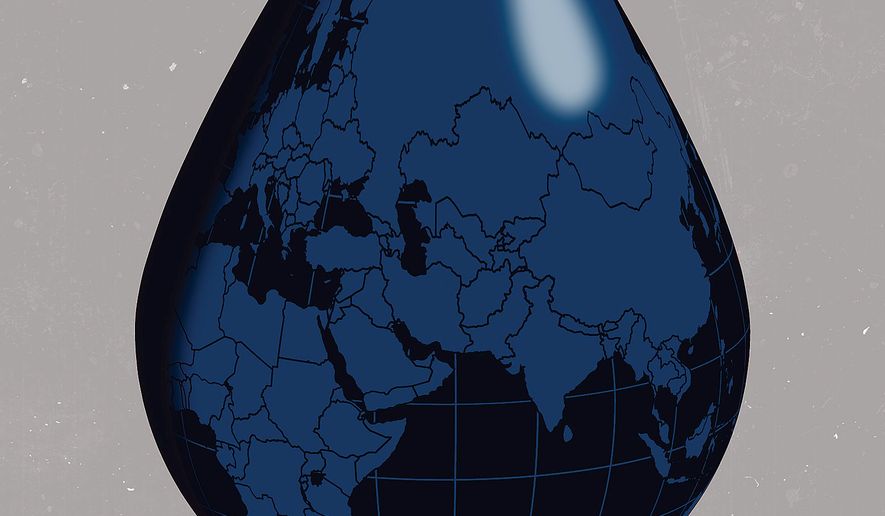OPINION:
President Trump is correct to be concerned about the European Union’s over-reliance on natural gas imports from Russia. In the interest of Western energy security, it is important that the president’s foreign policy team elevate the building of the Trans-Caspian Pipeline (TCP) to the top of America’s foreign policy priorities.
Initially proposed by the United States in 1996, the TCP is a global energy transportation project that would connect Central Asia to Europe via Azerbaijan and the Caspian Sea. This 186-mile underwater pipeline would connect the Turkmen port city of Turkmenbashi on the eastern shore of the Caspian Sea to Baku across the Caspian Sea. When combined with natural gas export from Kazakhstan and Uzbekistan, TCP could carry close to 50 billion cubic meters (bcm) of natural gas from Central Asia along the Southern Corridor pipeline system through Azerbaijan, Georgia and Turkey into Europe.
The Southern Corridor pipeline that has the full support of the United States and European Union originates in Azerbaijan. This pipeline system currently carries close to 4 bcm of natural gas but is planned to export close to 10 bcm after 2020. An investment of around $5 billion would allow for a small underwater interconnector to be built across the Caspian, thus linking Central Asia to Europe.
There are four overarching geo-political and economic benefits that would accrue from the realization of TCP.
First, diversifying natural gas supplies into Europe will enhance the continent’s overall energy security. According to the European Commission, 69 percent of Europe’s natural gas needs come from imports with a majority — 37 percent or 155.7 bcm — coming from Russia. In view of Moscow’s checkered history of playing politics with its energy exports, it is important that Europe lay the foundations for reliable and stable imports of natural gas from new suppliers. If as a result of TCP, 60 bcm of Europe’s current 401 bcm of gas imports were to be provided by Azerbaijan, Uzbekistan, Kazakhstan and Turkmenistan, Europeans can rest assured of stable energy security.
The second rationale for a stronger support of TCP by Mr. Trump’s foreign policy team has to do with economic development of Central Asia and the Caucasus region. Specifically, the U.S. has an interest in the stable economic development of and job growth in Central Asia. Currently, the combined GDP of Kazakhstan, Uzbekistan and Turkmenistan stands at $250 billion. If over time TCP adds just another 5 percent to the GDP of these Muslim nations it would mean an extra $12.5 billion annually.
Ironically, prosperity and stable economic growth in Central Asia and the Caucasus is not only in America’s interest but would also benefit Russia. Prosperous nations with high per capital incomes along the periphery of Russia means Moscow can sell more of what it produces into these regions.
The third benefit of TCP relates to an immediate consequence of economic development within Central Asia; namely, its impact on employment opportunities for the youth. Although there is no scientific correlation between youth unemployment and radical Islam in Central Asia, preventing the region from becoming an incubator for Islamic extremists can be addressed through economic growth and job creation.
Here, too, Washington should impress upon Moscow that the success of the Muslim countries within the region in not allowing religious extremism to incubate in Central Asia is to the benefit of Russia. For example, if only 10 percent of the financial gain that Moscow currently receives from annual gas sales to Europe were to accrue to Uzbekistan, Kazakhstan, Turkmenistan and Azerbaijan it would translate to $2.3 billion. This sum could be directed to job training, apprenticeships and scholarships for the youth in Central Asia.
The final geo-political advantage of TCP is that it solidifies the key role of Azerbaijan as the reliable and stable anchor of Western energy security. The late American statesman Zbigniew Brzezinski described this secular Muslim nation of 9 million as “the cork in the bottle” of Caspian energy exports. Indeed, Azerbaijan and the United States share a common goal of uninterrupted development and transportation of energy exports from the Caspian Sea region to Europe.
One of the first steps Washington can take to achieve this global energy project is to encourage Azerbaijan and Turkmenistan to jointly develop the Kapaz/Sardar oil and gas condensate field in the Caspian Sea. This “baby step” will give confidence to Turkmenistan, Uzbekistan and Kazakhstan to join forces with Azerbaijan to build TCP. And even though American energy companies have started to reorient themselves to developing shale oil/gas in the U.S., either European energy giants such as Eni or Middle East companies such as UAE-based Adnoc or Saudi Aramco can take the lead in building, operating and maintaining the Trans-Caspian Pipeline.
In 1996, President Clinton placed American energy interests on the top of his agenda and supported the Baku-Tbilisi-Ceyhan pipeline that carries close to 1 million barrels of crude oil to Europe each day from the Caspian Sea. By placing the Trans-Caspian Pipeline at the top of his agenda, President Trump can score a big win for global energy security.
• S. Rob Sobhani is CEO of Caspian Group Holdings.




Please read our comment policy before commenting.